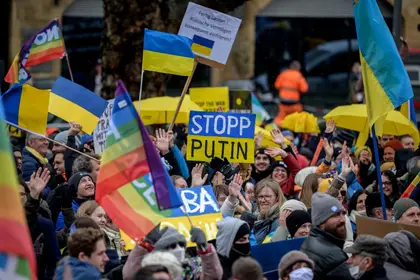The war may not be over, but it has already changed Ukrainian society profoundly. I hate the war and would much prefer that it had never happened.
But there’s no denying that it’s had some positive side effects. One of them is a shift in attitudes toward the LGBT community.
JOIN US ON TELEGRAM
Follow our coverage of the war on the @Kyivpost_official.
In the months since Russia launched its all-out invasion last year, LGBT Ukrainians in the armed forces have been seizing the chance to show that they can be just as brave, self-sacrificing, and patriotic as anyone else.
Many soldiers have told their stories on the social media pages of communities that defend the rights of LGBT military personnel. You’ll see stories like Ivan’s, who at the start of 2022 was working as a bartender and planning to enter the university. But when the Russians launched their full-scale invasion in February, he immediately joined the army. On the same page you can find a post from Anna, a serving member in the Armed Forces of Ukraine who was also one of the organizers of Kharkiv’s Pride Parade.
A recent national poll published in February shows that positive and neutral attitudes in the first year of the war toward the LGBT community have increased from 53 to 64 percent – quite a shift in just 12 months.
I’m glad to see that things are moving in the right direction – but we still have a long way to go. Ukraine is a conservative country, and many stereotypes and hateful attitudes persist. After Dmytro Stasishen, a 25-year-old junior lieutenant in the army, came out as bisexual on Instagram, his commanders asked him to transfer to a different unit, and his mother received threats if her son didn’t “stop shaming the Armed Forces of Ukraine.”

Latest on Russia’s Intransigence to End War Against Ukraine
“It was scary,” he admitted to me. Yet he still sees positive signs. “Ukraine is not Russia. People look at Russia and see how huge homophobia and intolerance are there. Then they look at practices in Europe and change their perception. Many Ukrainian soldiers have started coming out, and people think: ‘He’s in the military, he fights, so everything’s okay.’”
Ukrainian parliamentarians in mid-March introduced a bill on civil unions among both different- and same-sex couples. Inna Sovsun, a member of the liberal Holos party, proposed the draft law with explicit reference to the LGBT soldiers who are currently defending Ukraine on the front lines, noting that their partners still don’t have the same rights as officially married couples.
This draft law does not provide an opportunity for official same-sex marriage, but recognizes the rights of those who have a relationship and live together. With this bill, Ukraine has gone further than any other post-Soviet country bordering Russia that has not yet been able to join the EU.
This is not the first attempt to eliminate discrimination. Last summer, a petition to legalize same-sex marriage was posted on the website of the President of Ukraine. In a little over month, it picked up the 25,000 signatures required for the President to consider the petition.
President Volodymyr Zelensky responded by noting that same-sex marriage would require changing that constitution – something that can’t be done under the current conditions of martial law. But he noted that the government is moving ahead with plans for civil unions.
In March, Deputy Minister of Justice Valeria Kolomiets announced that the ministry is working on a draft law that it hopes to submit it to parliament this year.
Not long after Kolomiets made her announcement, the All-Ukrainian Council of Churches and Religious Organizations declared its opposition to the bill already working its way through parliament.
In late March, the Ukrainian churches opposed the already submitted bill, saying it “contradicts the natural law established by God.” The churches appealed to the authorities to block its passage.
I’m not sure that church leaders are keeping up with society. Among my own family and friends, I’m seeing more and more evidence that the war is changing how they look at the issue.
The war has exposed Ukrainians to a variety of cultures and perspectives. Millions of them have now lived in Europe as refugees or have met foreign volunteers and aid workers in Ukraine itself. At the same time, the shared experience of existential threat has fostered a sense of empathy and compassion.
Meanwhile, Russian homophobic propaganda has tried to use the issue to turn against Ukraine and the West. Moscow’s hate-mongers claim that “the neo-Nazis have their backs covered by the LGBT Battalion” or that the Ukrainian army will lose because of its many gay soldiers and “possible celestial punishment.”
Activists have heard hair-raising stories of Russians brutally torturing Ukrainian LGBT people in the occupied territories. After Kherson was liberated, activist Maryna Usmanova, director of the feminist and LGBT-inclusive organization Insha (Other), said that LGBT people under Russian occupation were afraid of rape, and that people whose genders did not match their official documents were afraid of being strip-searched and abused at checkpoints.
Ukraine’s aspiration to join the EU will require global thinking and openness. But I believe we’re on the right track. Russian aggression has shown Ukrainians where intolerance can lead.
“Our people are adopting European values,” said Dmytro. “Freedom is also the freedom of personal choice. Freedom to be yourself.” And what are Ukrainians fighting for if not that?
The views expressed in this opinion article are the author’s and not necessarily those of Kyiv Post.
You can also highlight the text and press Ctrl + Enter










